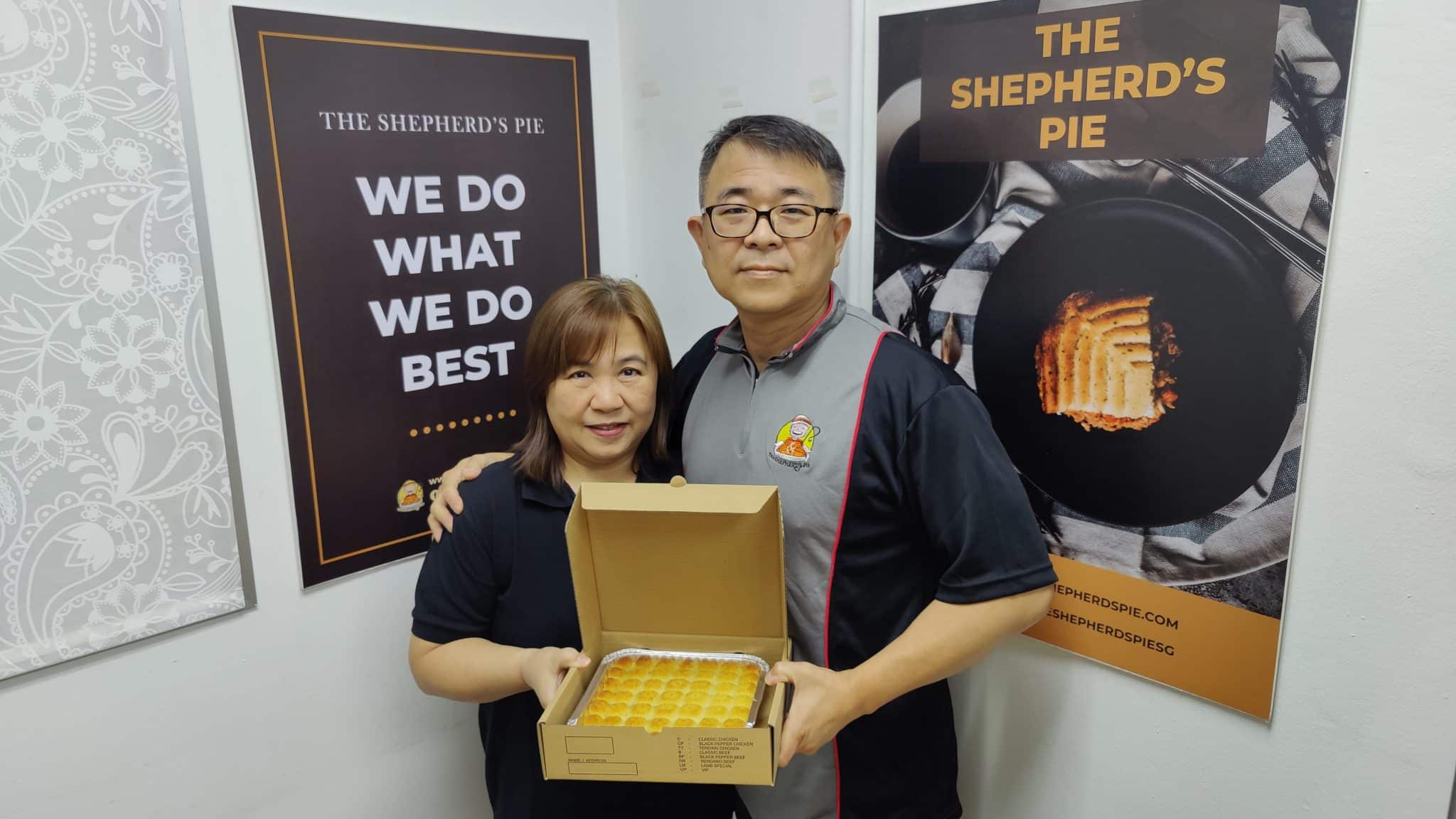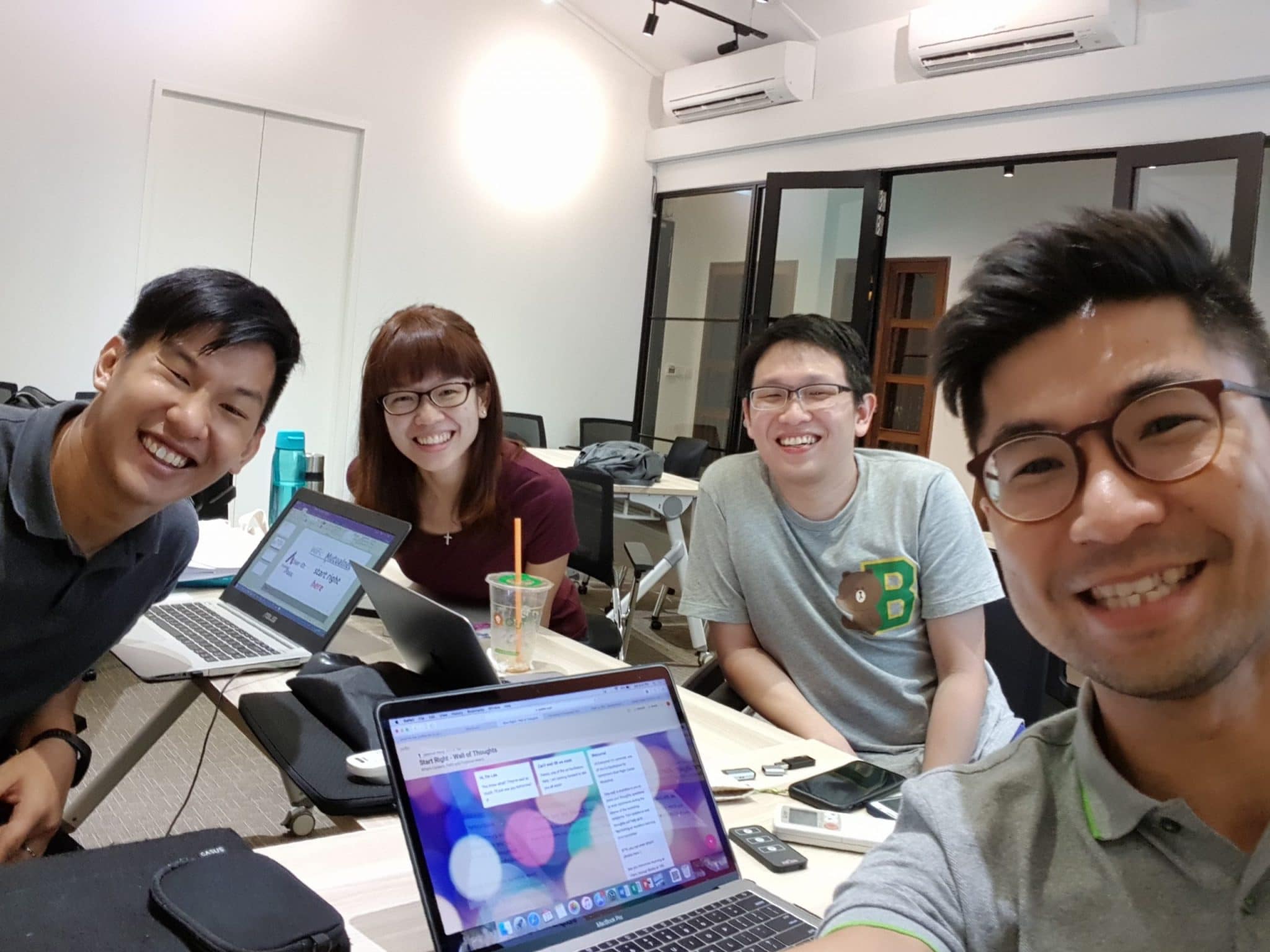The story of faith behind Taiwanese toast franchise Fong Sheng Hao
This Good Friday-Resurrection Sunday, Salt&Light brings you tales of faith, hope & new beginnings.
by Christine Leow // March 31, 2021, 7:29 pm
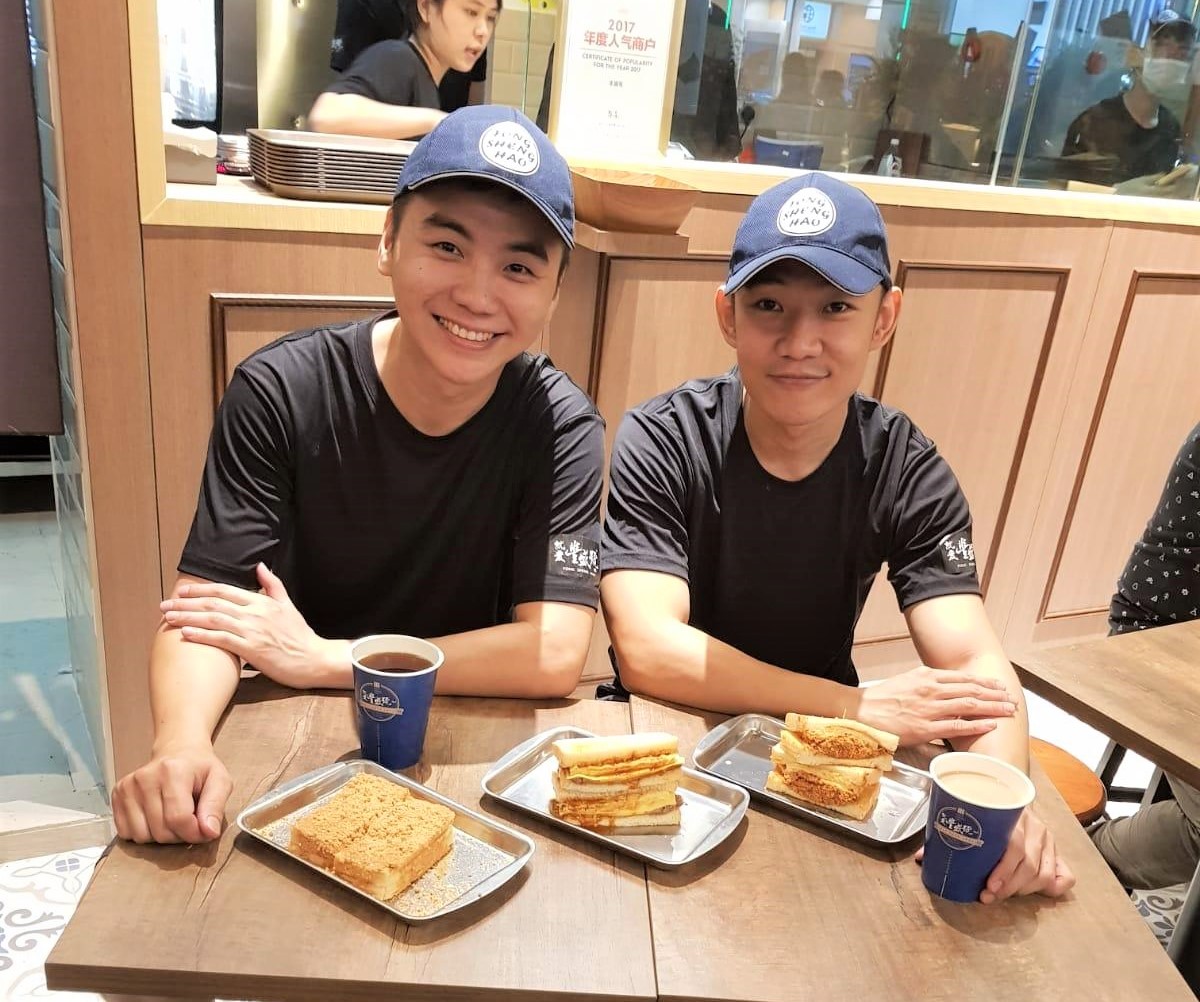
Louis Tan (right) with secondary school friend Benedict Tan. "Now I have a testimony that can motivate my sons,” said Louis of his faith journey in setting up Fong Sheng Hao with Benedict. All photos courtesy of Louis Tan.
The Fong Sheng Hao outlet at Nex is bustling for a weekday morning.
Almost every table is occupied. Plate after plate of thick breakfast toast generously stuffed with meat and eggs or slathered with sweet fillings are being served even as the fragrance of fresh-brewed coffee hangs in the air.
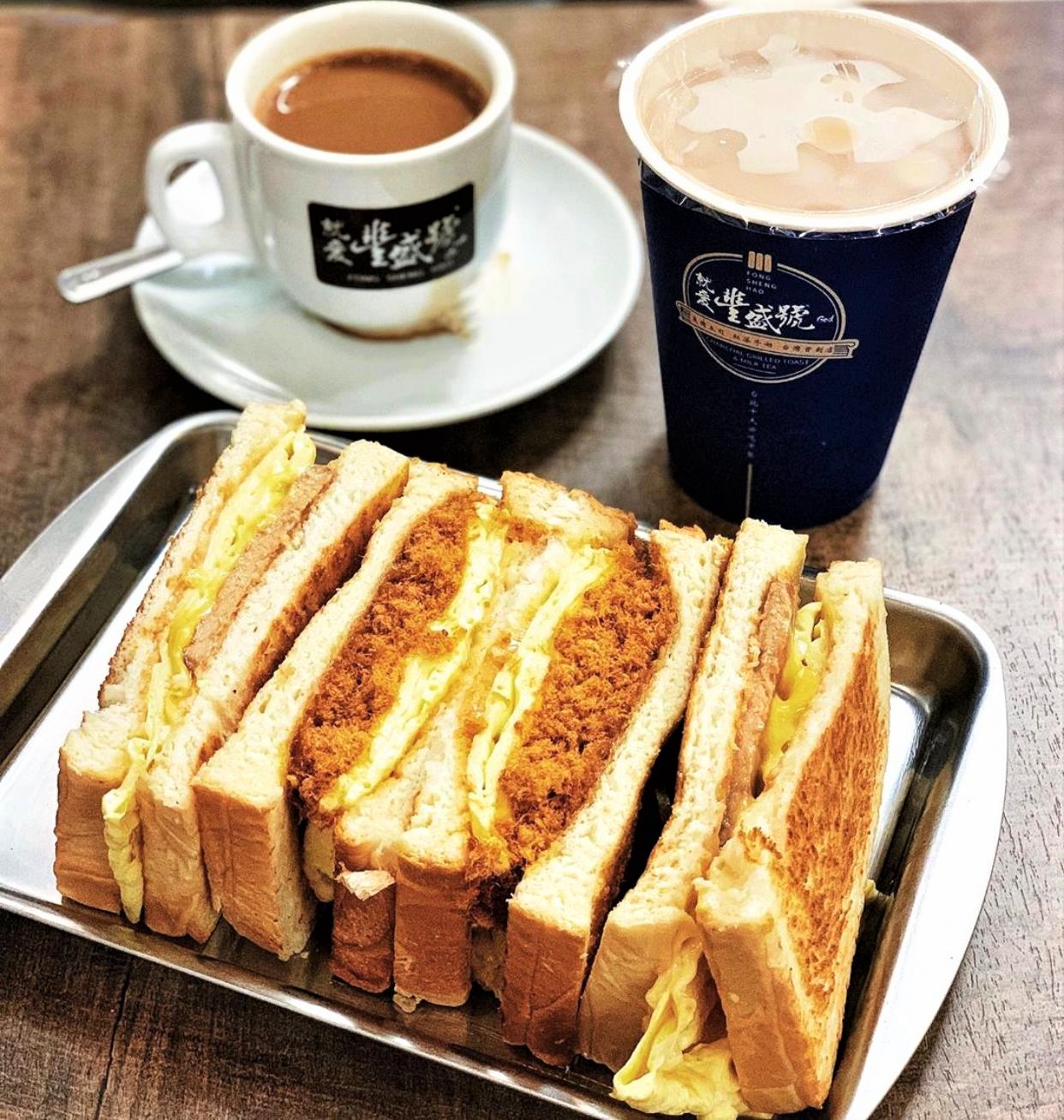
Fong Sheng Hao’s Taiwanese breakfast toasts are made with bread freshly baked in-house as well as condiments that are made from their own special recipe.
Tell Louis Tan, founder of the Taiwanese toast franchise, that his business is doing remarkably well given these difficult times, and he will tell you in Mandarin: “This is all God’s blessing.”
The words have been often uttered. But coming from the 33-year-old, they are said with such genuine awe and wonder that you know it is a truth he has experienced over and over again.
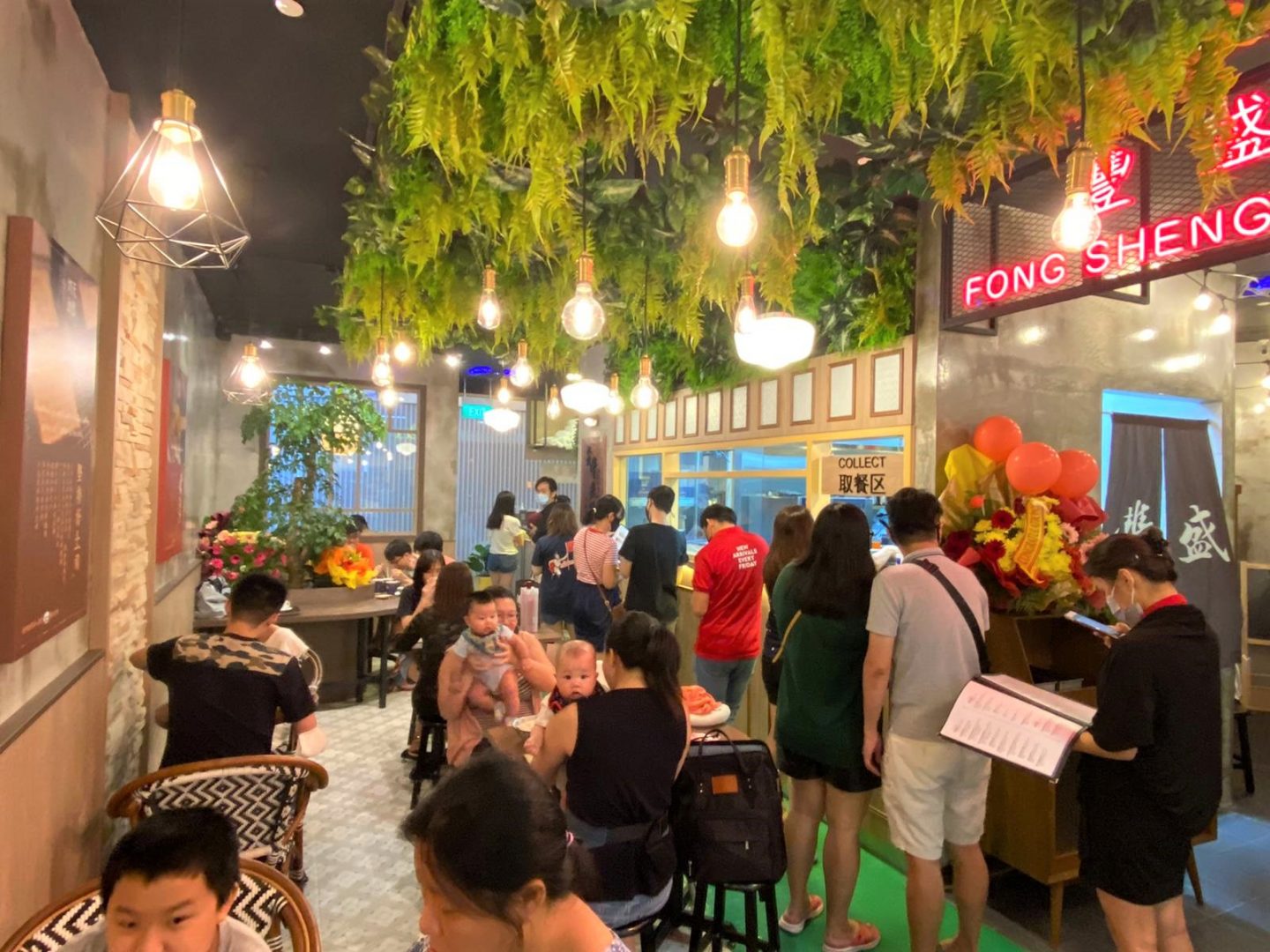
Fong Sheng Hao’s second outlet at Nex opened in late 2020. Tan has hopes of opening 20 to 30 more outlets in the years to come.
Just two years ago, Tan would not have imagined he would be the boss of even one café. Now, he runs two Fong Sheng Hao outlets and has 28 staff under his care.
In fact, two years ago, he did not even have a job. He only had a dream.
The dad who wanted more
Tan was never one for studying. The youngest of three sons, he went to work after completing his ‘O’ levels instead of furthering his education.
Asked if his parents objected, he shrugged with a smiled: “My oldest brother went to the university. My second brother went to ITE.”
Two years ago, he did not even have a job. He only had a dream.
Given his brothers’ diverse education choices, by the time it came to him, his parents were more accepting of his decisions. Tan held several jobs, mostly in retail. “I worked in Watson’s, sold credit cards and even sold clothes.”
After a few years, he went to work in his father’s engineering company as a project co-ordinator because the pay was better. He would have continued quite comfortably and, in time, taken over the business.
Then, he got married and became a father in his 20s.
“Being a first-time dad was tough,” he said.
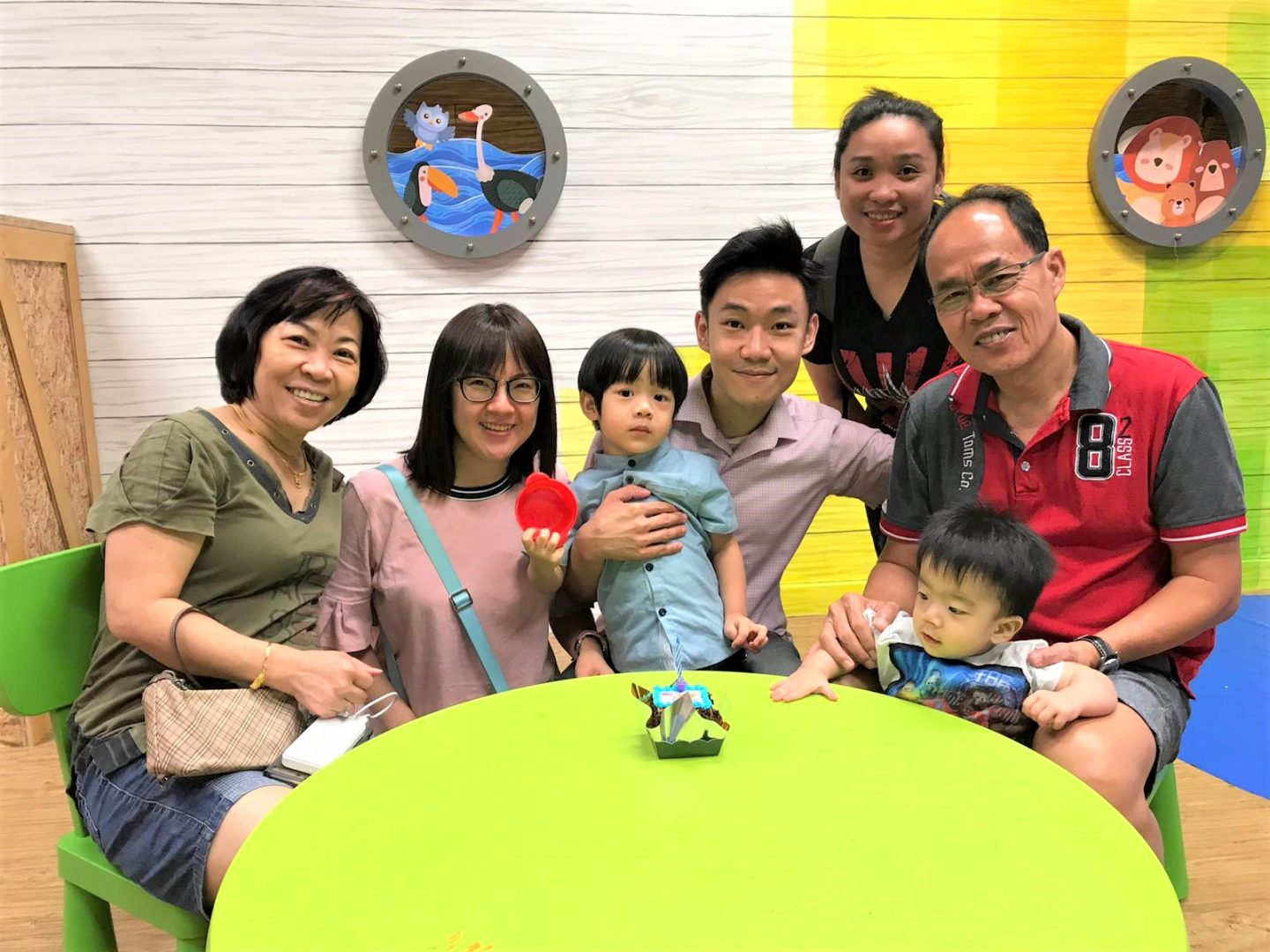
Tan with his parents (extreme left and right) and wife, Joanne, and sons Lucas and Leon, as well as their domestic helper.
The self-confessed easy-going guy who “lived each day at a time” suddenly began to think of the future.
“My son became sort of my mentor. Because of my new role as a father, I suddenly wanted to learn new things.”
“Many times, I would be a bit down because I began to wonder: If my son asked me what I do, what would I say? When they are grown, how would they look at me? What kind of father do I want to be?
“I had no qualifications, no skills, not much passion. Working in my father’s company was just for a livelihood.
“My son became sort of my mentor. Because of my new role as a father, I suddenly wanted to step out of my comfort zone and learn new things.”
Tan began to wonder if he could carve out a path for himself beyond his father’s company.
“I had a friend doing F&B and I saw him doing well. With my family background, my father being a businessman, I thought I could probably start my own business, too.”
The man with a mission
The question then was: What business to do? He had only ever worked in sales, in which he had no interest.
“Then, I thought about what I liked – I like to eat. I can’t cook, but I can eat. And I love breakfast. I love bread for breakfast.”
That sparked a plan to start a breakfast café because “everybody has to eat”.
“Then, I thought about what I liked – I like to eat. I can’t cook, but I can eat.”
But Tan knew it was too big a project to pull off on his own.
He decided to bring in his secondary school friend, Benedict Tan, with whom he had kept in touch all these years.
“Ben is a person with a good character, he’s very smart, loyal and has integrity. He’s also methodical.
“When you get a business partner, you must find someone with a good character, not wily, so he won’t take shortcuts.”
Though Tan was always “the one who slept in class while others worked”, and though Benedict had a stable job, Tan managed to convince his friend to take the leap with him.
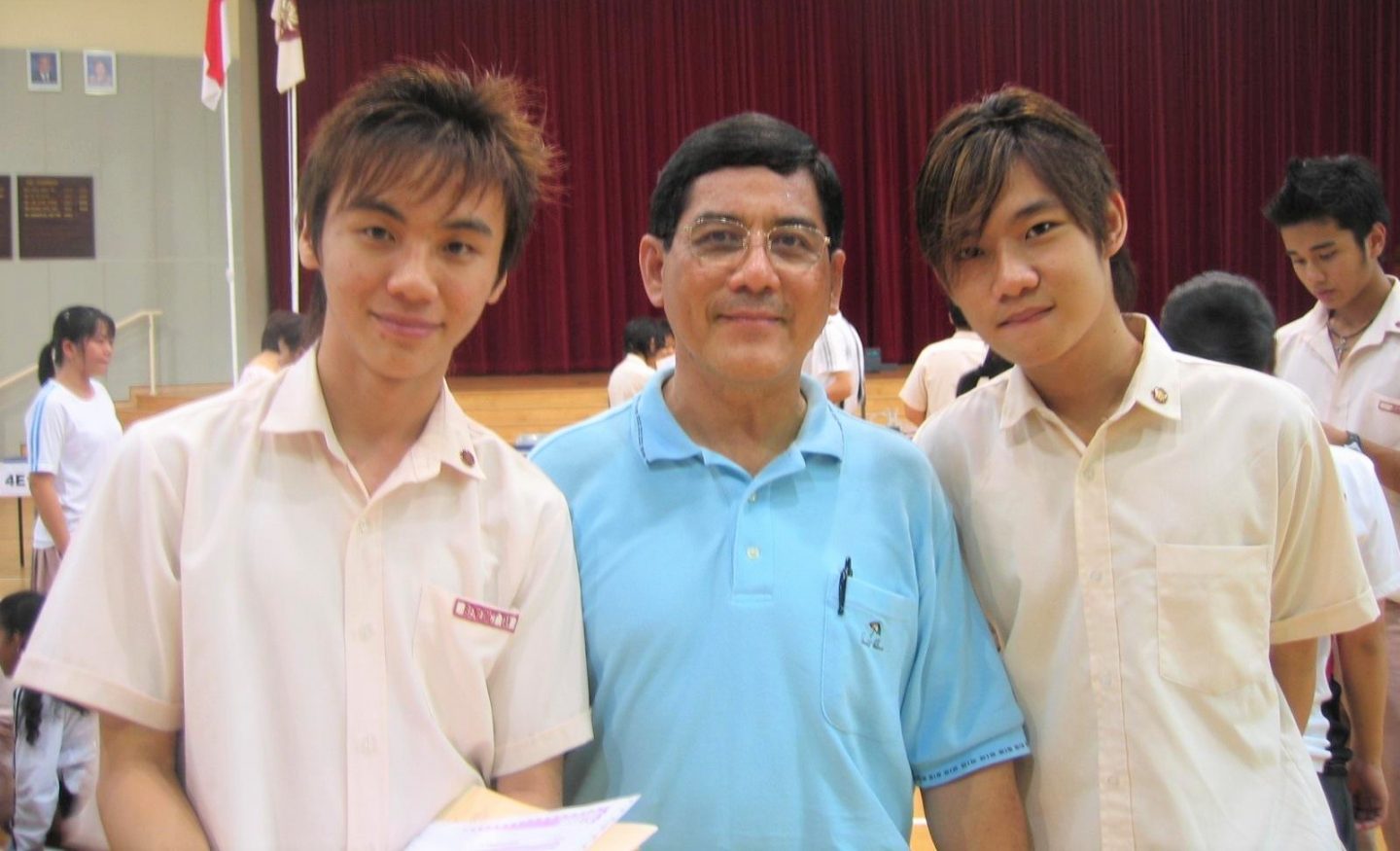
Benedict Tan (left) and Louis Tan (right) at 17, with their teacher.
“He’s a great support. If not for him, the plan would not have worked out.”
Together, they spent six months doing market research before zeroing in on Taiwanese breakfast foods.
“Taiwan had the widest variety of breakfast foods. Plus, Singaporeans are familiar with Taiwanese breakfast food culture because of travel and food tv shows and they think Taiwanese food is very innovative and fresh.”
Next, came a trip to Taiwan to find breakfast cafés to work with.
Love that won the heart
They singled out six Taiwanese breakfast brands. Fong Sheng Hao was their top choice.
But when they approached the main outlet, the manager gave them just 15 minutes to make their pitch.
“He treated us like his younger brothers.”
“We ended up talking for over an hour. I have never had that kind of favour in my life before. It gave me confidence in my idea,” said Tan.
The duo returned to Singapore, hopeful but not expecting much. Then, they received a message from the owner of Fong Sheng Hao, Steven Hsu.
“He gave us a topic to research on and told us to return to Taiwan to present it to him.”
They would return to Taiwan not just for a day to speak to Hsu as planned, but for an entire year to learn the craft from the man himself when they won the franchise rights to Fong Sheng Hao.
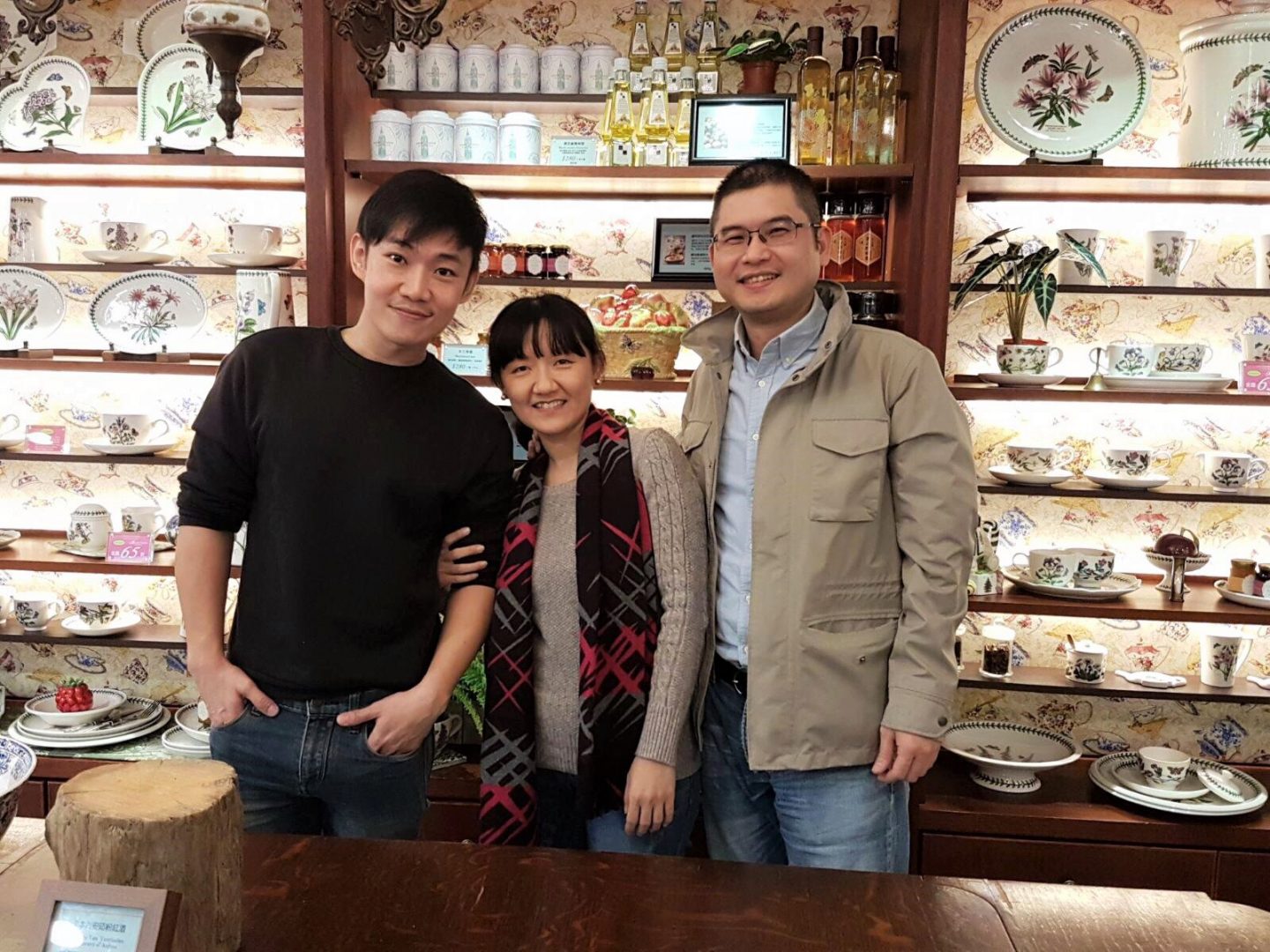
Tan with Steven Hsu (right), the owner of Fong Sheng Hao in Taiwan, and his wife. Tan lived in Taiwan for a year learning the business from Hsu.
It was Hsu who helped change Tan’s life.
“I wanted a business partner but Hsu showed us love instead. He treated us like his younger brothers. He spent a lot of time and effort teaching and guiding me,” said Tan.
At the time, Tan knew that Hsu was a Christian and that Fong Sheng Hao was a Christian brand because the verse John 10:10 is incorporated into the company’s branding. But he was not a believer.
It was in the year that Tan lived in Taiwan under Hsu’s tutelage that he saw what it meant to be a Christian.
“Business people usually think about what benefits them. But Hsu never talked about money. He said that Fong Sheng Hao is God’s brand. He is just the steward.
He saw how Christian love was evident in the way the company was run.
“Hsu would often tell us, ‘If you want your brand to succeed, you have to help others out unconditionally and care for them. Then, when they succeed, you will be blessed as well’.”
Working shoulder to shoulder with Hsu and his wife, Tan saw “the joy in their lives”. The older couple would share deeply with Tan, taking him under their wing and treating him “like family”.
Tan saw Christian love in their marriage. He also saw how Christian love was evident in the way the company was run.
“The boss and his wife always showed concern for their staff. They never scolded. They were never sarcastic. They always encouraged and built people up. It was very different from my previous workplaces. I was moved.
“The brand is built on motivating people. It’s very lifestyle-oriented. It wasn’t just about numbers. It was about people relations and bringing warmth to people.”
“I would close my eyes and just listen as I grew up in a different religion. But I was moved by the prayers.”
In the mornings, Hsu would start the work day praying with his staff.
“I would close my eyes and just listen as I grew up in a different religion. But I was moved by the words.
“Being away from home, living in a strange place without your family – it was not easy. So, I was touched by the prayers. I felt a peace. I believe that when you need love, God will touch you.”
In time, Hsu invited Tan to join him at church services and small group meetings. In church, Tan saw once more how the Christian faith changed lives.
“I met the Taiwan pastor’s father who is nearly 90. He talked about dying with such peace, without fear but with hope. It was more like, ‘I’ll catch up with you later’ instead of it being final. I liked it. It’s very positive.
“It was very different from the way my grandfather talked about death. There was a lot of anxiety when my grandfather talked of dying.”
By the time his year in Taiwan was up, Tan was very open to Christianity.
Hsu encouraged him to find a church when he returned to Singapore. A friend introduced him to one with a Chinese service because Tan was more comfortable with Mandarin.
“He talked about dying without fear but with hope. It was more like, ‘I’ll catch up with you later’, instead of it being final.”
On his first visit, he was invited to lunch by a befriender and her husband after the service. Coincidentally, the pastor of the church walked by while they were eating. Tan and the pastor got to talking.
“I told him that I really wanted to be a Christian but I faced challenges. If I became a Christian, does that mean I wouldn’t be able to hold the joss stick? If anything happened to my father, then I wouldn’t be able to pay my respects to him.
“He told me that, because God’s love is unconditional, His love will embrace us and He will forgive us our sins.
“After hearing that, there and then, I prayed to receive Jesus into my life.”
On Tan’s next trip to Taiwan, he got baptised at the church he had attended for a year.
The faith to follow
With the franchise licence secured, Tan had to set up shop. But that proved to be a challenge.
Because Fong Sheng Hao was not a known brand in Singapore, getting malls to lend them space was tough. He approached nearly 20 malls, sometimes waiting for up to five hours to speak to the managers. Each time, he would come away disappointed.
“I was under a lot of pressure. I was alone because Ben was working as an Uber driver in the meantime. I was jobless, living on my savings.
“You can’t use logic, you can’t use science. It was all God’s blessing.”
“But I refused to admit defeat. I prayed and gave God my needs.”
To help in the search for a shop space, he engaged an agent who eventually found him a place at Paya Lebar Quarter (PLQ). It was not his idea of an ideal location but he “went by faith”.
The day before the grand opening of the café, another problem arose. They were told that their fire safety certification had not been approved.
“We were told at 8.28pm. All the food had been delivered from the central kitchen. If we didn’t open that Friday, we would have to wait till Monday to re-submit the permit. Then, it would be mid-week before we would get the approval. All our food would have been spoilt by them.
“We were desperate. So, the Taiwan boss and all of us prayed. At 9pm, we got an email to say that we got the approval after all. We were the last unit to get the approval.
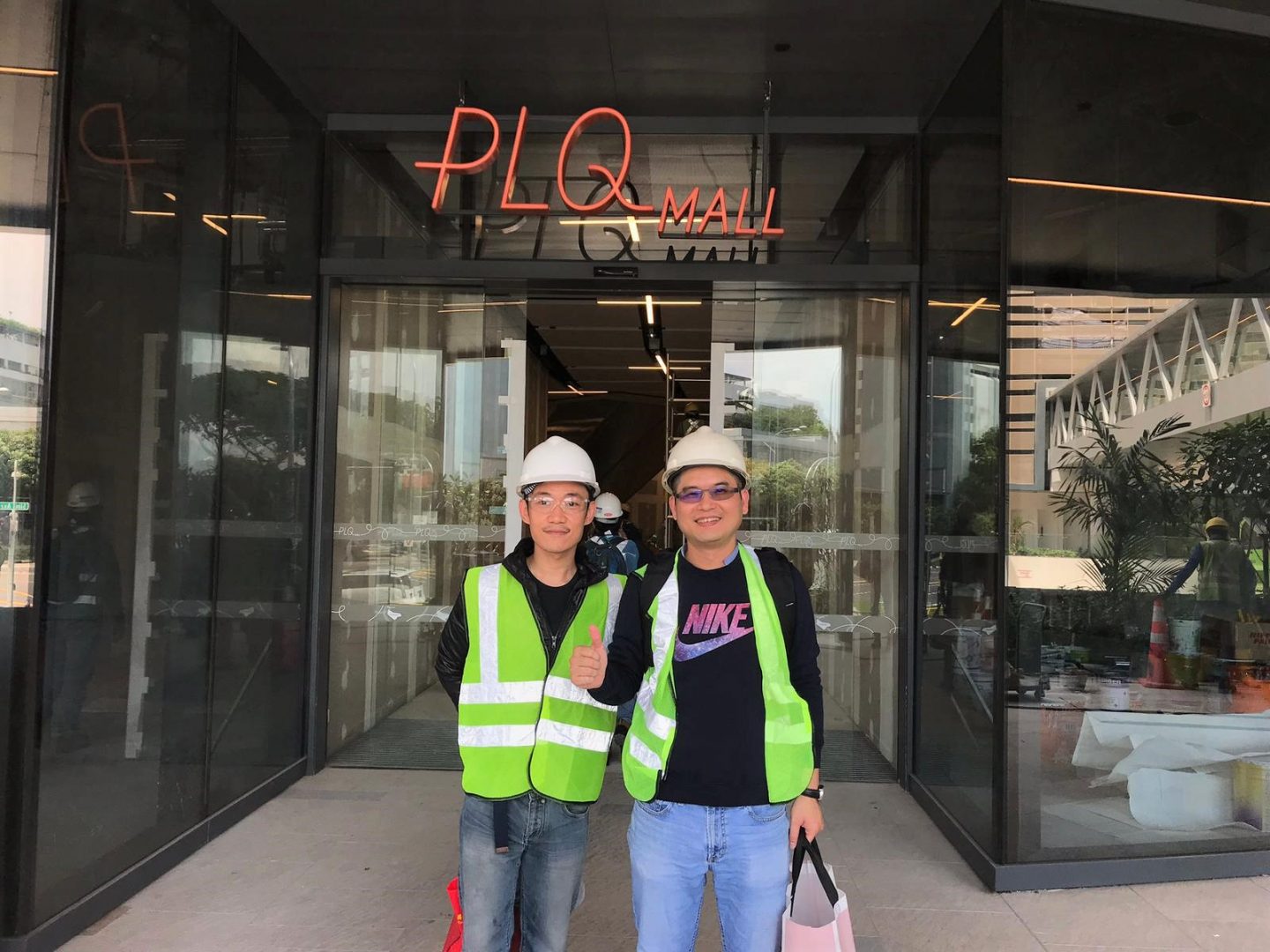
Tan with Hsu outside Paya Lebar Quarter where the first Fong Sheng Hao cafe in Singapore is located.
“You just can’t explain this. You can’t use logic, you can’t use science. It was all God’s blessing.”
Once they launched the business at PLQ, they discovered that the location was actually a blessing.
“We were considered a star brand because we were novel. People kept talking about us and we got a lot of publicity.”
Love that blesses
Since opening day, Tan has made sure to hold true to his faith and the Fong Sheng Hao brand culture. The cafés begin each day in prayer because “prayer is the foundation of the Fong Sheng Hao culture”.
“The morning prayers are important because we want to give the day to God and humble ourselves in His presence.”
“We don’t push the faith. We are very sensitive. We say, ‘If you are not a Christian, just close your eyes and receive the blessing’.
“The morning prayers are important because we want to give the day to God and humble ourselves in His presence. I want to be more than a brand. I want my people to know God’s love, and bring it back home and to the community to be a blessing.
“Those who have been with us long enough tell us that praying makes them feel that we are all equals and it makes us humble and more willing to see the needs of others. It creates a healthy work environment.”
Like his mentor Hsu, Tan prefers a softer approach when managing his staff. “God is love. Encourage, don’t criticise.”
Nurturing his staff is very important to Tan. When he notices good practices being employed, or good ideas being raised, he will encourage them to share these with the rest of the team, cultivating a culture of learning.
“They tell us that praying makes them feel that we are all equals … It creates a healthy work environment.”
“They become very open to sharing. I tell them, ‘You are all my teachers’. I learn a lot from them.”
That same concern extends to the customers as well. “If God gave us His best, we must give our best to our customers.”
When Singapore went into Circuit Breaker mode last year, every business was affected. Fong Sheng Hao, not even a year old, was not spared.
Instead of worrying about his livelihood, Tan decided to “offer something good”. He set up a table outside the café and left their freshly baked bread there for anyone to “take what you need and leave what you don’t”.
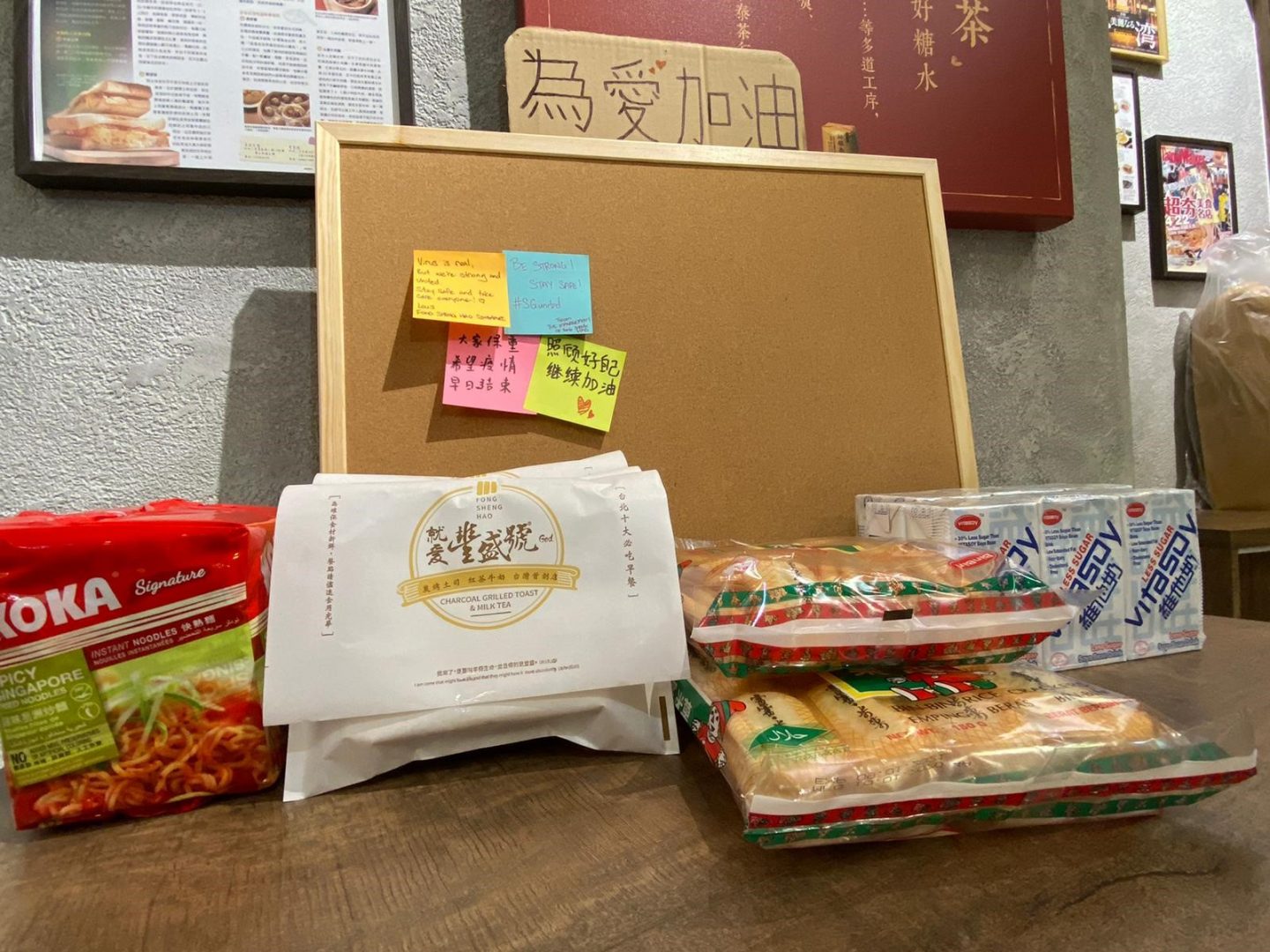
The food corner Tan set up during the Circuit Breaker became a heart-warming community project. Apart from the bread from Fong Sheng Hao that was left for passers-by, people would contribute encouraging notes as well as food from their homes.
“We couldn’t do much but at least we could offer this since we are in the food business.”
When they ran out of bread, they left instant noodles and snacks. Soon, passers-by joined in, contributing whatever extras they had at home.
Fong Sheng Hao also gave out black tea to pregnant women and their signature lurou fan (braised pork rice bowl) to senior citizens. Each elderly person could get one free bowl a day.
Tan agreed that, at a time when everyone was losing money, giving freebies did not make economic sense.
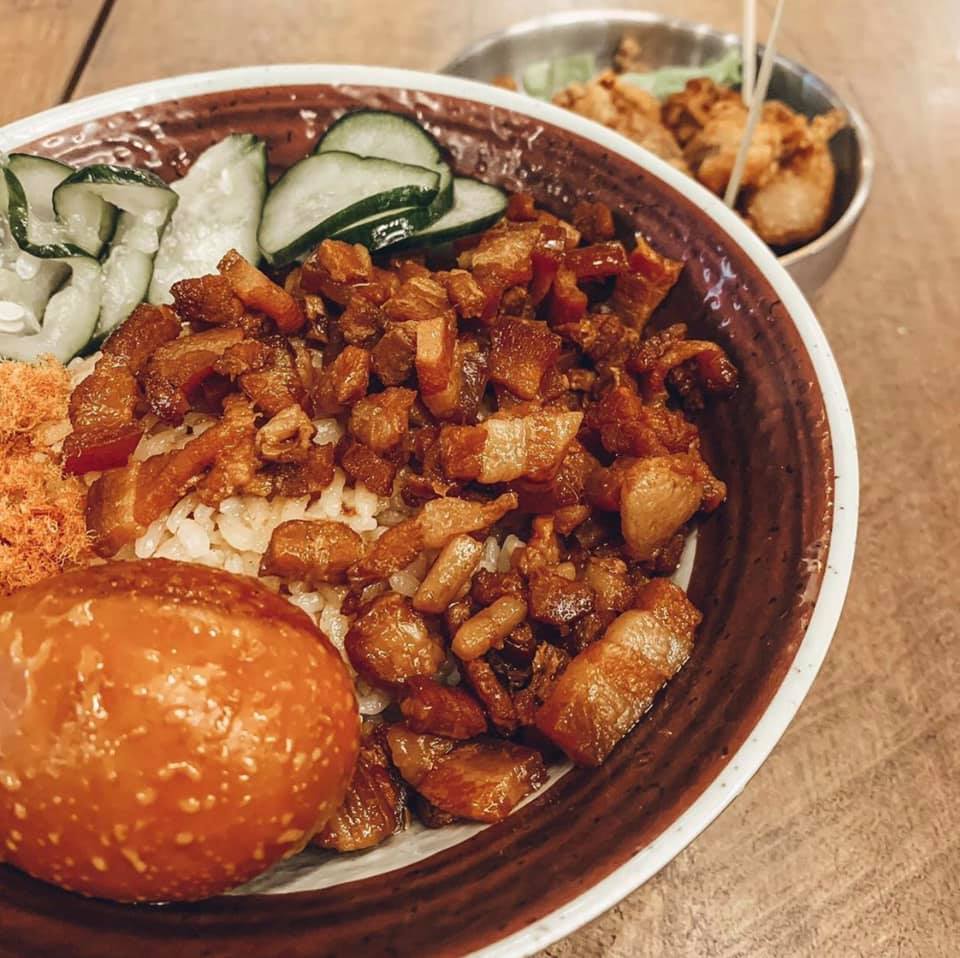
Fong Sheng Hao gave out braised pork rice bowls to the elderly during the Circuit Breaker to bring cheer. Photo from Fong Sheng Hao’s Facebook account.
“But this was about helping the community. I was wondering, ‘In F&B, how do you show people God’s love?’ So, I thought of this.
“It isn’t about just having faith alone. It is about how people treat one another and how we can be a blessing to others.”
“Since becoming a Christian, I have learnt to do what I can and let God do the rest.”
The Circuit Breaker was also a time when Tan saw God’s timing at work. Months before the pandemic hit Singapore’s shores, he had signed the company onto the four delivery platforms available. When April came around and dining in was ruled out, Fong Sheng Hao was ready to deliver their food.
The appearance of Facebook community initiative Hawkers United – Dabao 2020 also came in handy. Tan used the platform to promote his delivery service.
As a result, Tan’s business boomed in a time when many F&B outlets were struggling. “We open at 8am. By 11am, we would have received well over a hundred orders and there would be 20 or so delivery food riders waiting outside (our café).
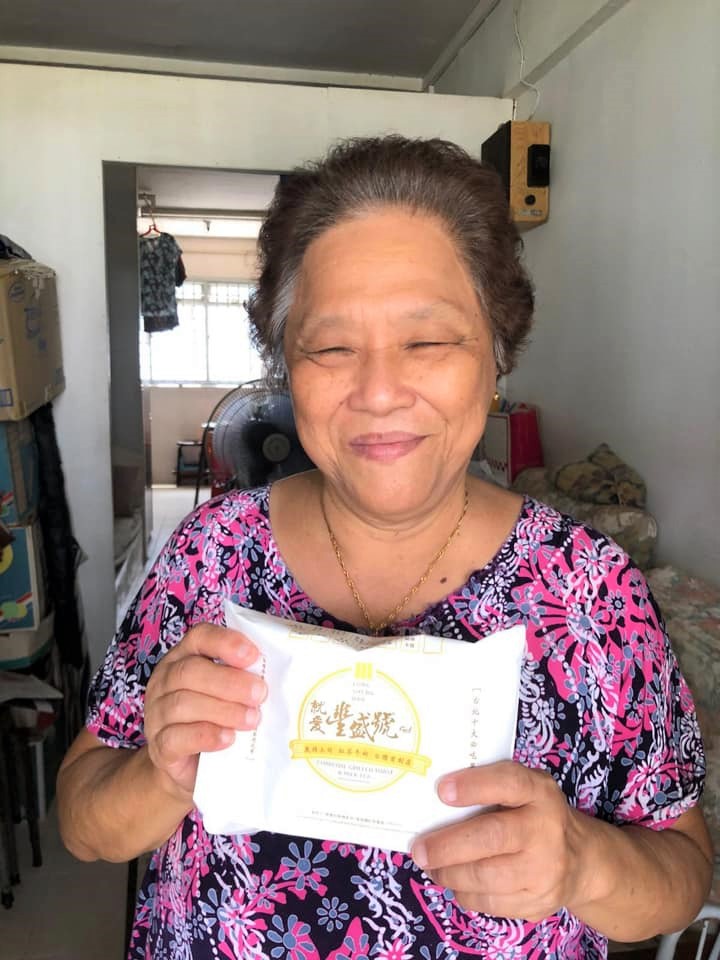
Fong Sheng Hao also partnered Lions Befriender in May and July 2020 to give out their sandwiches to the elderly. Photo from Fong Sheng Hao’s Facebook account.
“If not for God’s blessing like this, we would not be able to open our second shop. Since becoming a Christian, I have learnt to do what I can and let God do the rest.”
Tan confessed he would never have been so much at peace or this generous in the past.
“Being a Christian has taught me how to be a better person. If seeing God’s love can change me like this, then we can change others by showing God’s love to them as well.”
This is his hope for everyone who crosses his path. This is his hope for his two sons as well.
“I want to have a testimony that I can share with them. If I had done nothing, when they encounter difficulties, I would have nothing I could teach them. Now, at least I have a testimony that can motivate them.”
IF YOU LIKED THIS STORY, READ:
Break my heart, Lord, for what breaks yours: Refugees, missions and you
We are an independent, non-profit organisation that relies on the generosity of our readers, such as yourself, to continue serving the kingdom. Every dollar donated goes directly back into our editorial coverage.
Would you consider partnering with us in our kingdom work by supporting us financially, either as a one-off donation, or a recurring pledge?
Support Salt&Light
